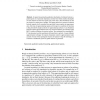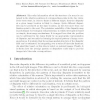521 search results - page 13 / 105 » Learning By Observation Using Qualitative Spatial Relations |
154
click to vote
RSCTC
2000
Springer
15 years 6 months ago
2000
Springer
Abstract. In spatial reasoning the qualitative description of relations between spatial regions is of practical importance and has been widely studied. Examples of such relations a...
135
click to vote
ICANN
2010
Springer
15 years 3 months ago
2010
Springer
Learning processes allow the central nervous system to learn relationships between stimuli. Even stimuli from different modalities can easily be associated, and these associations ...
149
click to vote
JAIR
2008
15 years 2 months ago
2008
Experience in the physical sciences suggests that the only realistic means of understanding complex systems is through the use of mathematical models. Typically, this has come to ...
FLAIRS
2006
15 years 3 months ago
2006
This paper outlines a symbolic computational theory for recognizing variable spatial environments-The Theory of Cognitive Prism, (Dong 2005). This theory defines distance and orie...
138
click to vote
BVAI
2007
Springer
15 years 8 months ago
2007
Springer
Abstract. Binocular information about the structure of a scene is contained in the relative positions of corresponding points in the two views. If the eyes rotate, in order to fix...


